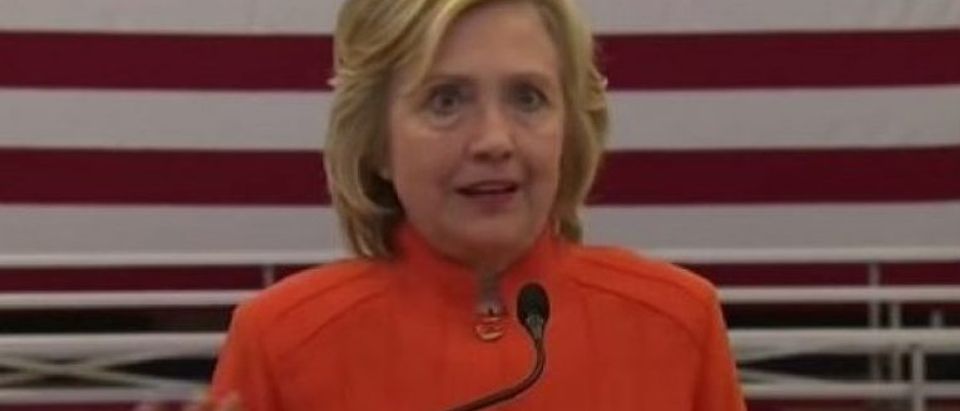A State Department official who works in the part of the agency that handles public records requests has undermined a key claim that Hillary Clinton has made in defense of her unorthodox email practices.
In a deposition given to the watchdog group Judicial Watch on Wednesday, Karin Lang, the State Department’s director of Executive Secretariat staff, said that it would not have been “reasonably possible” to obtain Hillary Clinton’s emails through the Freedom of Information Act before she turned the records over in Dec. 2014 — nearly two years after she left office.
That conflicts with Clinton’s longstanding claim that her email practices were above board — and not an attempt to skirt FOIA requirements — because the “vast majority” of her emails were available to the State Department through other officials’ government email accounts.
“More than 90% of those emails should have already been captured in the State Department’s email system before she provided them with paper copies,” reads an email “fact sheet” on Clinton’s campaign website.
“The State Department was able to search and produce Clinton’s emails when needed long before, and unrelated to, receiving the printed copies as they were already captured on state.gov accounts,” the “fact sheet” also states.
But Lang told Judicial Watch that the State Department collects records from the custodian of the records, or the person that sends or receives them. That means that there was little chance — given that Clinton used a personal email account — that FOIAs seeking her emails would have been detected by Lang’s bureau.
Several FOIA requests for Clinton’s emails were filed during her tenure as secretary of state. But all were rejected because the responsive records could not be located.
Lang’s statements boiled down to a claim of “we didn’t know what we didn’t know.”
“The practice — the way the State Department stores email records is by custodian, by the employee who sent or received those emails,” she told Judicial Watch attorney Michael Bekesha.
“So in order to search, for example, for Secretary Clinton’s emails, if they were stored in other custodians’ electronic archives, it would not be possible to do that except by searching individual custodian by individual custodian, which would not be reasonably possible.”
Asked why that would not be reasonably possible, Lang said that the State Department has 70,000 employees.
Wednesday’s deposition provided two other notable revelations.
Lang revealed that Clarence Finney, the director of the Correspondence and Records offices, which oversees FOIA requests, inquired about Clinton’s email practices in 2011 after seeing a now-iconic photo of the then-secretary of state wearing sunglasses while using her BlackBerry.
“When Mrs. Clinton’s photo appeared in the media with her using — appearing to use some sort of a mobile device, Clarence Finney checked with [the staff with the Executive Secretariat’s Information Resource Management division] to confirm…whether the answer was still that she did not have a State.gov e-mail account,” Lang said.
Lang had testified that Finney had been informed in late 2008 or early 2009, when Clinton was transitioning into her role, that she would not be using a government email account.
After seeing the picture of Clinton using her BlackBerry, Finney seemingly questioned whether she had changed her practices. After being told that Clinton was still not using a government email account, Finney — who will be deposed by Judicial Watch later this month — appears not to have asked if she was using a personal email account. (RELATED: IG Report: Hillary Refused To Make Secret Email Account ‘Accessible’)
As is now known to the world, Clinton used her non-government BlackBerry to send and receive all of her personal and work-related emails.
Lang said Finney could not recall who at S/ES-IRM told him that Clinton was not using a government email account.
The then-director of S/ES-IRM, John Bentel, is one possibility.
The now-retired career official has become a key figure in the Clinton email inquiry after a State Department inspector general’s report released last month identified him (by title; not by name) as having told two information technology staffers not to ask questions about Clinton’s email server.
Bentel also reportedly falsely told the staffers that the State Department’s office of the legal adviser had approved Clinton’s server. That division was never told about Clinton’s server.
Lang revealed in her deposition that Bentel is not cooperating with the State Department.
She listed off the names of current and former State Department officials she talked to in preparation for her deposition and said that she “reached out to John Bentel through counsel, who declined to speak with State.” (RELATED: ‘Filegate’ Attorney Represents State Dept. Tech Official Who Is Silent On Hillary’s Server)
Bentel has also refused to talk to Congress to discuss his knowledge about the server. He reportedly told the House Select Committee on Benghazi last year that he did not know about the server. But since then he has declined invitations from two Senate committees to discuss the setup.
His attorney is Randy Turk of the high-profile law firm Baker Bott. Turk represented Craig Livingston, a Bill Clinton White House official who was implicated in “FileGate,” a scandal which involved the mishandling of FBI files for hundreds of George H.W. Bush and Ronald Reagan White House officials.
The Clintons arranged a legal defense fund for Livingstone, who was not charged in the case.


